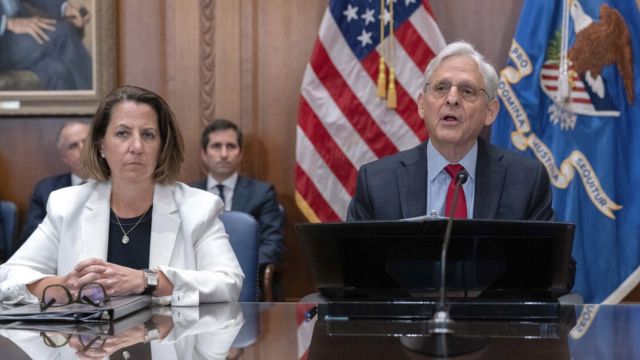According to officials, the Justice Department’s COVID-19 Enforcement Task Force has been successful in the past three years. They have charged over 3,500 individuals with federal crimes, managed to recover more than $1.4 billion in stolen pandemic funds, and have achieved over 400 civil settlements and judgments.
White House officials and lawmakers seized the opportunity presented by the announcement to put forth legislative proposals aimed at enhancing anti-fraud enforcement, extending the statute of limitations for prosecuting crimes, and improving government databases to enhance the detection of improper payments.
Attorney General Merrick Garland assured reporters on Tuesday that the investigation and prosecution of pandemic relief fraud will persist, with a strong focus on recovering the assets that have been unlawfully taken from American taxpayers.
Investigations found false billings and siphoning money from children’s meals
This Article Includes
Fraud investigations encompass a wide range of examples, such as:
-
- Federal charges unveiled in September 2022 against 47 people accused of siphoning $250 million from a coronavirus pandemic relief program designed to provide meals for children, in “a brazen scheme of staggering proportions.”
- A sweep of suspects including doctors, marketers and manufacturers of fake vaccination cards in April 2022 resulted in charges against 21 people accused with $149 million in false billings and theft from government programs.
- Fifteen of the largest and hardest-hit states awarded hundreds of millions of dollars in sole-sourced, non-competitive awards went to vendors for items such as masks that have been accused of defrauding taxpayers, a USA TODAY investigation found .
Lawmakers, White House call for legislation to expand fraud enforcement
Democratic senators and White House officials argued on Tuesday that legislation is necessary to continue the fight against COVID fraud. They unveiled a bill that includes provisions aimed at combating fraudulent activities associated with the pandemic.
According to Senator Gary Peters, a Democrat from Michigan and the chair of the Homeland Security and Governmental Affairs Committee, the pandemic resulted in an unprecedented surge in fraudulent activities. He further emphasized that unscrupulous individuals capitalized on the crisis to exploit it for their own financial benefit.
Here are some of the proposals that have been put forward:
-
- Tripling the funding to $300 million for prosecution teams coordinating pandemic fraud investigations.
- Raising the cap on penalties in civil fraud cases to $1 million from $150,000.
- Providing $250 million to the Small Business Administration and Labor Department inspectors general to identify and recover fraud.
- Extending the statute of limitations on pandemic unemployment insurance fraud to 10 years from five years.
According to a statement by Deputy Attorney General Lisa Monaco, it is crucial to extend the statute of limitations and obtain the necessary funding and data analytic tools. This will enable prosecutors to recover hundreds of millions of dollars in fraud proceeds, ensure that all offenders are brought to justice, and ultimately disrupt criminal networks that are still victimizing our citizens.
According to Sen. Ron Wyden, D-Ore., the chair of the Finance Committee, there is another crucial provision that aims to establish a system for verifying Social Security numbers in order to prevent identity theft.
“This epidemic is truly alarming,” expressed Wyden. “Countless Americans have fallen prey to identity theft.”
According to Gene Sperling, the American Rescue Plan coordinator and senior adviser to President Joe Biden, it is crucial to allocate funding for multiple years in order to hire investigators capable of pursuing the most sophisticated criminals.
Sperling emphasized the need for a longer statute of limitations and increased resources for enforcement and oversight in order to effectively target and combat sophisticated criminals and criminal syndicates who exploit the system. He stated that in order to retain qualified personnel, it is crucial to provide the necessary security and resources for multi-year hiring. Without these measures, there is a risk of losing skilled individuals who are essential in tackling the most egregious cases of abuse.
The Department of Justice (DOJ) has made significant progress in its efforts to combat pandemic aid fraud. As part of its crackdown, the DOJ has successfully recovered a staggering $1.4 billion and has brought charges against approximately 3,500 individuals. This represents a major step forward in holding those responsible accountable for their actions.
The DOJ’s actions demonstrate its commitment to ensuring that funds intended to provide relief during the pandemic are not misused or exploited. By actively pursuing cases of fraud and prosecuting those involved, the DOJ is sending a clear message that such behavior will not be tolerated.
The recovery of $1.4 billion is a significant achievement and will undoubtedly help to alleviate the financial burden caused by fraudulent activities. This money can now be redirected to those who genuinely need it, ensuring that the intended recipients receive the support they require.
The charges filed against 3,500 individuals highlight the extent of the problem and serve as a warning to others who may be considering engaging in fraudulent activities. The DOJ’s efforts to hold these individuals accountable are crucial in maintaining the integrity of the aid programs and protecting the interests of the American people.
Fraudulent activities related to pandemic aid not only undermine the effectiveness of relief efforts but also erode public trust in the system. The DOJ’s actions play a vital role in restoring confidence and ensuring that funds are allocated appropriately.
As the fight against pandemic aid fraud continues, the DOJ’s commitment to pursuing justice remains unwavering. By recovering funds and bringing charges against those responsible, the DOJ is taking decisive action to protect the integrity of aid programs and safeguard the interests of the American public.

